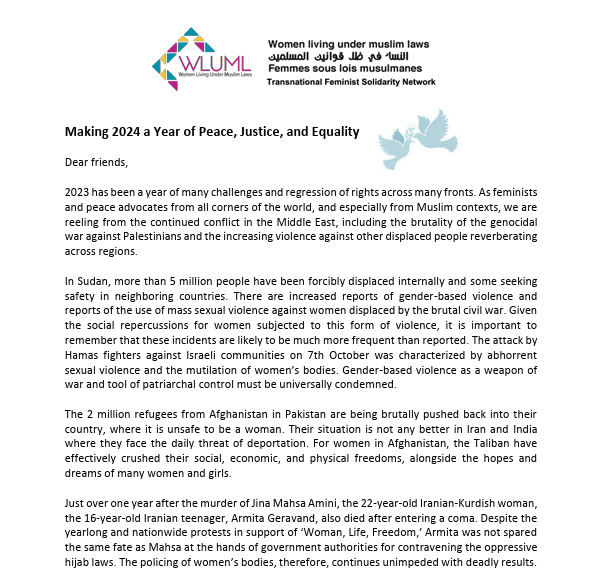Dear friends,
2023 has been a year of many challenges and regression of rights across many fronts. As feminists and peace advocates from all corners of the world, and especially from Muslim contexts, we are reeling from the continued conflict in the Middle East, including the brutality of the genocidal war against Palestinians and the increasing violence against other displaced people reverberating across regions.
In Sudan, more than 5 million people have been forcibly displaced internally and some seeking safety in neighbouring countries. There are increased reports of gender-based violence and reports of the use of mass sexual violence against women displaced by the brutal civil war. Given the social repercussions for women subjected to this form of violence, it is important to remember that these incidents are likely to be much more frequent than reported. The attack by
Hamas fighters against Israeli communities on 7th October was characterized by abhorrent sexual violence and the mutilation of women’s bodies. Gender-based violence as a weapon of war and tool of patriarchal control must be universally condemned.
The 2 million refugees from Afghanistan in Pakistan are being brutally pushed back into their country, where it is unsafe to be a woman. Their situation is not any better in Iran and India where they face the daily threat of deportation. For women in Afghanistan, the Taliban have effectively crushed their social, economic, and physical freedoms, alongside the hopes and dreams of many women and girls.
Just over one year after the murder of Jina Mahsa Amini, the 22-year-old Iranian-Kurdish woman, the 16-year-old Iranian teenager, Armita Geravand, also died after entering a coma. Despite the yearlong and nationwide protests in support of ‘Woman, Life, Freedom,’ Armita was not spared the same fate as Mahsa at the hands of government authorities for contravening the oppressive hijab laws. The policing of women’s bodies, therefore, continues unimpeded with deadly results.
While there is hope that the 7-year imposed war on Yemen might come to an end, it has left the country in utter devastation in its wake. This has stark consequences for women and girls and the 4.5 million people displaced, with more than a quarter of them female-headed households with little resources.
But, it is always darkest before dawn
Civil society within and outside Iran is preparing for a better future. WLUML and WLUML networkers have joined the feminist coalition to translate the motto of ‘Women, Life, Freedom’ into specific demands and a vision for future Iran. After several consultations and strong debates online and in-person, they have presented the Iran Women’s Bill of Rights as a living document. Find the latest version of the Bill in Farsi here: www.IWBR.org
WLUML board members devoted much time from 2019 to 2023 to recruit and organize several webinars, conferences, and workshops on the constitutionalization of women’s rights in Muslim contexts. The scholars and the practitioners gathered presented on the complexities of the
history, and current opportunities and pitfalls, of ensuring gender equality in national constitutions. The total seven contributions were extensively workshopped and edited on several occasions, with the final products published in the Manchester Journal of Transnational Islamic Law and Practice. WLUML, in collaboration with scholars and practitioners across the region, is working further on the constitutionalization of women’s rights in Muslim contexts.
We have been solidifying our networks across the region throughout the past years, and this year joined forces with our Turkish sisters of the Women’s Equality Platform (ESIK) to host a major webinar featuring advocates of women’s rights from Iran, Turkey, and Afghanistan, on the “Backlash against women’s rights and our strategies.” Two WLUML board members traveled to Istanbul in September 2023 to meet with our Iranian, Kurdish, Turkish, and Afghan networkers, and exchange experiences and knowledge on how to best combat the revived backlash against women’s rights and advocacy. Our webinars, gatherings, and exchanges emphasized the significance of enhanced feminist solidarity networks and collaboration at such times.
We have also had a strong presence in conventional media and published many articles on the situation of women in Afghanistan and in Iran. We joined forces with other organizations and participated in webinar demonstrations. We held consultation meetings with women from Afghanistan and Iran as well as organizations that are working to improve the situation of women and children, particularly around humanitarian and women’s education, including the Women and Children Legal Research Foundation.
This year, our Network has focused on campaigning for the international community and the United Nations to legally recognize gender apartheid and condemn the systematic segregation and exclusion of women from public life and public spaces in Afghanistan by the Taliban. We have lobbied the Canadian and German governments to support the call for the UN recognition of gender apartheid as a crime against humanity. 88 women and human rights organizations have signed our petition and more than a hundred influential women journalists, intellectuals, and human rights activists have signed it. Karima Bennoune, the highly respected and recognized expert on international law and gender apartheid, was invited to give a lecture on the importance
of mobilizing and demanding that the UN and the international community acknowledge this systematic crime against women. Nobel Peace Prize Laureate Dr. Shirin Ebadi was invited to give the keynote talk at our event held jointly with Canadian Women for Women in Afghanistan on UN Peace Day on 21 September. Read and sign the petition for the legal recognition of gender apartheid here. See our statements of solidarity here.
For this Year’s 16 Days of Activism, WLUML council member Pasqualina Eckerström curated the virtual concert ‘Songs of Protest’. She interviewed three courageous Iranian women musicians, and they in turn shared their messages to the Iranian people and their talents with the world. Despite the Iranian regime’s efforts to silence female voices by banning female lead singers, these women continue to use their voice as an expression of self-identity and resistance. See the full concert on WLUML’s social media.
Despite the setbacks and increased violence, we have witnessed global solidarity grow. Ordinary people across the world are protesting against state-sanctioned violence. We have felt the solidarity between feminists, peace activists, and minority advocates strengthening. Citizen journalism and personal perspectives and analysis are breaking dominant narratives and preventing the silencing of alternative voices.
We know that we have always been our best resource. For this reason, we encourage networkers to hold each other close in our hearts and minds as we continue to work towards the realization of gender justice and peace.
In peace and sisterhood,
Women Living Under Muslim Laws (WLUML)
www.wluml.org


